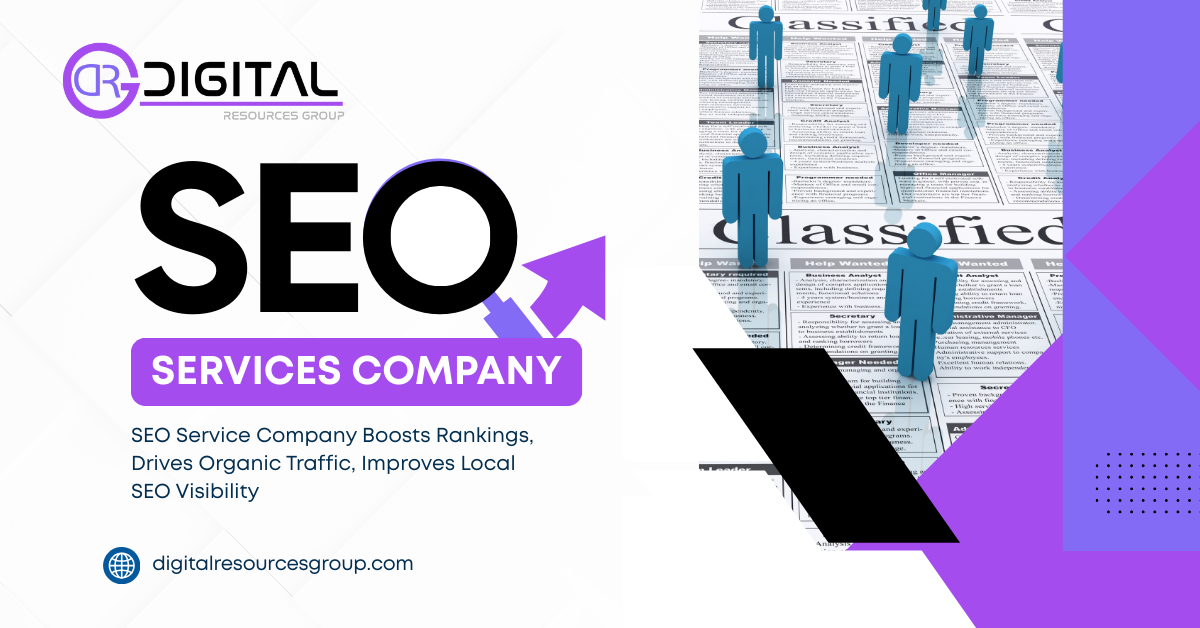- Digital Resources Group
- 0 Comments
- 287 Views
Digital Resources Group understands that in the fast-paced world of digital marketing, leveraging the right tools and strategies can significantly impact a business’s success. Google Pay-Per-Click (PPC) advertising has emerged as a leading method for driving targeted traffic to websites. It allows businesses to display their ads prominently on Google search results and partner sites, ensuring visibility to potential customers actively searching for their products or services. This article aims to provide a comprehensive guide to Google PPC management, detailing the process, strategies, and best practices to help businesses achieve their advertising goals.
In the digital age, where competition is fierce and online visibility is crucial, mastering Google PPC management can set a business apart. This article will explore the intricacies of Google PPC advertising, from understanding its functionality to optimizing campaigns for maximum return on investment (ROI).
Understanding Google PPC Management
Google PPC management refers to the process of creating, managing, and optimizing pay-per-click advertising campaigns on the Google platform. PPC advertising allows businesses to bid on keywords related to their products or services, displaying their ads when users search for those terms. The main appeal of PPC is its ability to generate immediate traffic and leads, making it a powerful tool for businesses looking to increase their online presence quickly.
A well-managed PPC campaign involves continuous monitoring and adjustment. Advertisers need to analyze performance metrics, such as click-through rates (CTR), conversion rates, and cost per acquisition (CPA). This data-driven approach ensures that businesses can optimize their advertising spend, focusing on the most effective keywords and ad copy that yield the best results.
The Importance of Google PPC for Businesses
Investing in Google PPC management is crucial for businesses seeking to enhance their online visibility. With billions of searches conducted daily on Google, PPC advertising provides an opportunity to reach a vast audience actively looking for specific products or services. Unlike organic search engine optimization (SEO), which can take time to yield results, PPC delivers immediate visibility, allowing businesses to appear at the top of search results almost instantly.
Moreover, Google PPC allows for precise targeting. Advertisers can define their audience based on various factors, including location, device type, and user behavior. This level of targeting ensures that ads are shown to the right people at the right time, increasing the likelihood of engagement and conversions. By leveraging Google PPC, businesses can effectively allocate their marketing budgets and maximize their reach to potential customers.
How Google PPC Works
At its core, Google PPC works on an auction system. Advertisers bid on specific keywords that they want their ads to appear for. When a user conducts a search, Google evaluates the bids and relevance of the ads, determining which ones to display based on a combination of the bid amount and ad quality. This system means that higher bids do not always guarantee ad placement; the overall quality of the ad also plays a crucial role.
Google employs a metric known as the Quality Score to evaluate ads. This score considers several factors, including the relevance of the ad to the keyword, the quality of the landing page, and the expected CTR. Ads with higher Quality Scores can achieve better positions at lower costs, highlighting the importance of creating relevant and high-quality ads to improve overall PPC performance.
Setting Up Your Google PPC Campaign
Setting up a Google PPC campaign requires careful planning and strategy. The first step involves defining the campaign objectives. These objectives could range from increasing website traffic to generating leads or sales. By identifying clear goals, businesses can tailor their PPC campaigns to meet specific targets effectively.
Once objectives are set, the next step is to create a Google Ads account. This involves selecting campaign types, defining target locations, and choosing budget limits. A well-structured account setup will facilitate easier management and optimization in the future. Businesses should also consider their audience and tailor their messaging accordingly to ensure that the ads resonate with potential customers.
Keyword Research for PPC Success
Effective keyword research is a cornerstone of successful Google PPC management. Identifying the right keywords to bid on can significantly impact the performance of an advertising campaign. Businesses should start by brainstorming relevant keywords related to their products or services and then use tools like Google Keyword Planner to analyze search volume, competition, and estimated costs.
In addition to selecting primary keywords, it is essential to consider long-tail keywords. These are more specific phrases that may have lower search volumes but often lead to higher conversion rates due to their targeted nature. By incorporating a mix of short-tail and long-tail keywords into the PPC strategy, businesses can optimize their ad campaigns for both visibility and relevance.
Creating Effective Ad Copy
Creating compelling ad copy is crucial for enticing users to click on ads. The ad copy should be clear, concise, and aligned with the search intent of the target audience. Key elements of effective ad copy include strong headlines, relevant keywords, and clear calls to action. The headline should grab attention and convey the main value proposition, while the description should provide additional details about the offering.
Incorporating ad extensions can enhance ad visibility and provide additional information to users. Ad extensions allow businesses to include extra links, phone numbers, and location information directly in the ad. This added value can improve CTR and overall campaign performance by providing users with more reasons to click on the ad.
Optimizing Your Landing Pages
Once users click on a PPC ad, they are directed to a landing page designed to convert them into customers. Therefore, optimizing landing pages is critical to the success of a PPC campaign. The landing page should be relevant to the ad and provide a seamless user experience. It should load quickly, be mobile-friendly, and have a clear call to action that guides users towards the desired action, whether that’s making a purchase or filling out a contact form.
A/B testing can be an effective strategy for optimizing landing pages. By testing different layouts, copy, and calls to action, businesses can determine which variations yield the best results. Continuous optimization based on user behavior and feedback can lead to higher conversion rates and improved ROI from PPC campaigns.
Bidding Strategies in Google PPC
Choosing the right bidding strategy is essential for maximizing the effectiveness of Google PPC campaigns. There are several bidding options available, including manual bidding, automated bidding, and enhanced cost-per-click (eCPC). Each strategy has its advantages and is suitable for different campaign goals.
Manual bidding gives advertisers complete control over their bids, allowing them to set specific amounts for each keyword. This can be beneficial for campaigns with limited budgets or specific goals. Automated bidding, on the other hand, uses algorithms to optimize bids based on the likelihood of conversion. This can save time and improve performance for campaigns with large numbers of keywords or when advertisers are unsure about bid amounts.
Tracking and Analyzing Your PPC Performance
Effective tracking and analysis are vital components of successful Google PPC management. By using tools like Google Analytics, businesses can monitor various performance metrics, including CTR, conversion rates, and cost per click. Analyzing this data helps identify trends and areas for improvement within the PPC campaign.
Regular performance reviews enable advertisers to adjust strategies based on real-time data. For instance, if certain keywords are driving traffic but not converting, businesses can consider refining their ad copy. Adjusting bids, or optimizing landing pages to enhance user experience and conversion potential.
Common Google PPC Mistakes to Avoid
Despite its effectiveness, many businesses make common mistakes when managing their Google PPC campaigns. One of the most prevalent errors is failing to conduct proper keyword research. Bidding on highly competitive or irrelevant keywords can lead to wasted ad spend and poor campaign performance.
Another mistake is neglecting to optimize landing pages. Directing traffic to a poorly designed or irrelevant landing page can result in high bounce rates and low conversion rates. Ensuring that the landing page aligns with the ad copy and provides a seamless user experience is essential for maximizing PPC effectiveness.
Conclusion
In conclusion, Google PPC management is a powerful tool for driving targeted traffic to a business’s website. By understanding how PPC works, setting up effective campaigns, conducting thorough keyword research, creating compelling ad copy. And continuously optimizing performance, businesses can achieve significant success in their online marketing efforts.
Digital Resources Group is committed to helping businesses navigate the complexities of Google PPC management, ensuring they achieve their advertising goals and maximize their return on investment. As digital marketing continues to evolve, staying informed and adaptable will be key to thriving in a competitive landscape.
FAQs
- What is Google PPC management? Google PPC management involves creating, managing, and optimizing pay-per-click advertising campaigns on the Google platform to drive targeted traffic to a website.
- How does Google PPC work? Google PPC operates on an auction system where advertisers bid on keywords. Ads are displayed based on bid amounts and ad quality, with Google determining placements based on these factors.
- What are the benefits of Google PPC advertising? The main benefits include immediate visibility, precise targeting of audiences, and the ability to measure performance through various metrics, making it easier to optimize campaigns.
- How can I improve my PPC campaign performance? Improving PPC performance involves thorough keyword research, creating compelling ad copy, optimizing landing pages, and continuously tracking and analyzing campaign metrics.
- What common mistakes should I avoid in Google PPC? Common mistakes include improper keyword selection, neglecting landing page optimization, and failing to monitor and adjust campaigns based on performance data.









